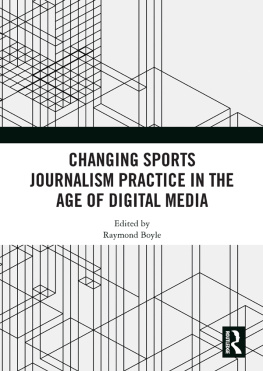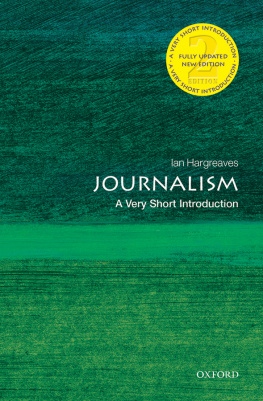Journalism:
A Career Handbook
Anna McKane

Published 2004
A & C Black Publishers Ltd
36 Soho Square
London W1D 3QY
www.acblack.com
Copyright Anna McKane 2004
Print ISBN: 978-0-71366-796-7
Ebook ISBN: 978-1-40810-337-1
A CIP catalogue record for this book is available from the British Library
All rights reserved. No part of this publication may be reproduced in any form or by any means, graphic, electronic or mechanical, including photocopying, recording, taping or information storage or retrieval systems, without the written permission of A & C Black Publishers Limited.
Contents
The transformation of journalism from a rather rough-and-ready trade into something like a profession has been a slow process, not least in terms of educational standards. When I left school in 1962 to take up a job as a cub reporter on a local weekly newspaper, I was obliged to work a six-month probationary period to ascertain whether I was suitable to be an indentured apprentice journalist. Once I signed up for my three-year apprenticeship, the major educational requirement was attendance at a college once a week to learn shorthand, law, the British constitution, advanced English and, supposedly, practical journalism. On-the-job training tended to be of the sink-or-swim variety but the editor was free with advice even if I foolishly ignored most of it and my two reporting colleagues, who were just a little older than me and only slightly more experienced, were also liberal with it.
At the time, all three of us young wannabes from the Barking Advertiser were less than enamoured of the day-release training at West Ham College of Further Education. Hindsight suggests that we were wrong because the course, overseen by the National Council for the Training of Journalists (NCTJ), was sensible. The teachers, whom I remember affectionately, were knowledgeable and conscientious. The central problem was a lack of enthusiasm among us students and there was a good reason for our apathy. We understood that the course culminated in a set of final exams which, if we passed, would gain us the NCTJ proficiency certificate, the industrys standard qualification and supposedly necessary for us to advance further in our careers. But within months of becoming journalists, we learned that national newspaper owners and editors couldnt give a fig for qualifications. Since Fleet Street was our goal it seemed pointless to work for a certificate. Indeed, many regional groups also ignored the NCTJs certificate: at the end of my indentures, despite having failed one part of the exam, I was taken on by the editor of an evening paper owned by one of Britains largest chains.
Therefore it was the industrys leading newspaper owners who undermined both the theory and practice of a journalistic education they affected to support. Some forty years on I would like to report that the situation has changed. Im sorry to say that it hasnt because there is still no formal recognition by owners and editors. The current picture is not nearly as bleak as it would seem, however, because there is no doubt that there is an informal acceptance of educational qualifications of a far higher standard than previously. Editors now expect that almost all the people who apply to them for jobs will have a university degree. Some, though not enough, also demand a level of journalistic training too.
In fairness, there have also been weaknesses in the NCTJ system. But, as this book points out, the NCTJ may be on the verge of sorting itself out: its in a period of transition under a thoughtful and energetic new chief executive. So there is a glimmer of hope that we are on the final road towards the establishment of a set of educational and professional standards for what is now rightly regarded as a profession. This understanding of journalisms improved status is one of this books underlying themes and strengths. It also recognises that journalism of all kinds newspaper, magazine, on-line, whether as reporter, sub-editor, photographer or designer stems from the same essential requirement: to tell the world as honestly as possible about as many subjects as possible.
Hopeful print journalists will find this an eminently sensible and comprehensive guide, providing the kind of valuable insider information which will enable them to take rational decisions about their futures. It is also enlivened by the experiences of journalism students who have taken that all-important first step on the career ladder. I cannot recommend it too highly.
Roy Greenslade
Professor of Journalism, City University
Thanks to all those, too many to list, who gave me all sorts of information and background, but special thanks to the following friends and colleagues for help with facts, impressions, advice and ideas: Melanie McFadyean, Harriett Gilbert, James Anslow, Barbara Rowlands, Barbara Norden (especially for her original list of books by journalists), Andrew Grant Adamson, Barbara Schofield, Neil Thurman, Ivan Barnes, Jonathan Pugh, David Driver and Andy Moger; to Jessica Hodge for help with the original idea and plan, and to Judith Millidge for editing the manuscript; to Christopher McKane, for facts and ideas, and for regularly cooking dinner.
Thanks to past and present students, in company with whom I discovered much of what I know about careers in journalism, and everything I know about football.
Note on gender
To avoid repetitions of the clumsy phrase he or she, I have so far as possible alternated he and she throughout the book. There are some areas of journalism where there are more women, particularly consumer magazines and features desks, but men are breaking in there, just as women are breaking into the final male bastion, the sports departments.
1
Working in Print Journalism
The only qualities essential for real success in journalism are a rat-like cunning, a plausible manner, and a little literary ability.
Nicholas Tomalin, Stop the Press,
I Want to Get On, in The Sunday Times, 1969
Estimates for the number of people working as print journalists in Britain today vary wildly. It seems likely that there are about 60,000 to 70,000 people involved more or less full time in print journalism, but there must be several thousand more who are slightly on the fringes, producing material for websites, travel brochures and the like. There are many graphic designers working for pressure groups, charities and firms, who would not regard themselves exactly as journalists but are doing a journalistic-type job. There are many more who do bits of journalism alongside their main job, because they have some expertise in an area, or because they know an editor. The field is expanding at present and there are expected to be several thousand more jobs in print and broadcast journalism in the next decade or so.
Journalism is about finding things out: the facts of a plane crash, the outcome of a court case, the latest attempts at spin-doctoring, David Beckhams new hairstyle. Then the idea is to tell as many other people as possible. Generally, this process will be a joint effort, with reporters doing the finding out, photographers taking a picture which makes a point, and the production team getting the material from them to the reader.
One misapprehension about journalists among the general public is that they all write articles. This is a word, incidentally, that few journalists ever use. They either talk about a story, a feature, or simply a piece. All this is known collectively as






